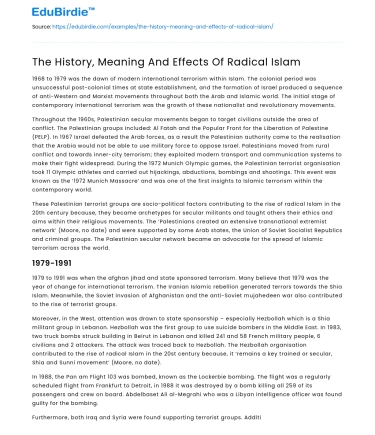1968 to 1979 was the dawn of modern international terrorism within Islam. The colonial period was unsuccessful post-colonial times at state establishment, and the formation of Israel produced a sequence of anti-Western and Marxist movements throughout both the Arab and Islamic world. The initial stage of contemporary international terrorism was the growth of these nationalist and revolutionary movements.
Throughout the 1960s, Palestinian secular movements began to target civilians outside the area of conflict. The Palestinian groups included: Al Fatah and the Popular Front for the Liberation of Palestine (PELP). In 1967 Israel defeated the Arab forces, as a result the Palestinian authority came to the realisation that the Arabia would not be able to use military force to oppose Israel. Palestinians moved from rural conflict and towards inner-city terrorism; they exploited modern transport and communication systems to make their fight widespread. During the 1972 Munich Olympic games, the Palestinian terrorist organisation took 11 Olympic athletes and carried out hijackings, abductions, bombings and shootings. This event was known as the ‘1972 Munich Massacre’ and was one of the first insights to Islamic terrorism within the contemporary world.
Save your time!
We can take care of your essay
- Proper editing and formatting
- Free revision, title page, and bibliography
- Flexible prices and money-back guarantee
These Palestinian terrorist groups are socio-political factors contributing to the rise of radical Islam in the 20th century because, they became archetypes for secular militants and taught others their ethics and aims within their religious movements. The ‘Palestinians created an extensive transnational extremist network’ (Moore, no date) and were supported by some Arab states, the Union of Soviet Socialist Republics and criminal groups. The Palestinian secular network became an advocate for the spread of Islamic terrorism across the world.
1979-1991
1979 to 1991 was when the afghan jihad and state sponsored terrorism. Many believe that 1979 was the year of change for international terrorism. The Iranian Islamic rebellion generated terrors towards the Shia Islam. Meanwhile, the Soviet invasion of Afghanistan and the anti-Soviet mujahedeen war also contributed to the rise of terrorist groups.
Moreover, in the West, attention was drawn to state sponsorship – especially Hezbollah which is a Shia militant group in Lebanon. Hezbollah was the first group to use suicide bombers in the Middle East. In 1983, two truck bombs struck building in Beirut in Lebanon and killed 241 and 58 French military people, 6 civilians and 2 attackers. The attack was traced back to Hezbollah. The Hezbollah organisation contributed to the rise of radical Islam in the 20st century because, it ‘remains a key trained or secular, Shia and Sunni movement’ (Moore, no date).
In 1988, the Pan am Flight 103 was bombed, known as the Lockerbie bombing. The flight was a regularly scheduled flight from Frankfurt to Detroit, in 1988 it was destroyed by a bomb killing all 259 of its passengers and crew on board. Abdelbaset Ali al-Megrahi who was a Libyan intelligence officer was found guilty for the bombing.
Furthermore, both Iraq and Syria were found supporting terrorist groups. Additionally, state sponsors used terrorist organisations to attack Israel, Western interests and both national and regional rivals. Also, the American policy of listing state sponsors was heaving politicalised and did not include several countries; allies and opponents of Washington were found guilty of supporting terrorism (Moore, no date).
1991-2001
From 1991 to 2001 was the globalisation of Islamic terror. Notably, the fragmentation of post-Cold War states, and the Cold War legacy of using advanced weapons has contributed to multiplying terrorism across the world. The absence of stable governments in many countries was an ideal to home terrorism, as there is a place for training, recruitment and illegal activities. As globalisation is advancing with easy transport and communication between states such as Iran and Iraq, it’s easier for them to carry out brutal attacks and enhance terrorist threats worldwide.
Since 1989, Afghanistan has become a training ground for terrorists, thus neighbouring country Pakistan can assist terrorist organisations in nearby countries. The Taliban militia group is a Sunni Islamic fundamentalist political movement founded in 1994. ‘The group's aim is to impose its interpretation of Islamic law on Afghanistan and remove foreign influence from the country’ (CNN, 2019). They are supported by Pakistan, as the organisation offered to encourage terrorism, by providing essentials such astraining facilities and travel documentation. The fact neighbouring organisations work together in both training and fighting opposition has caused a rise in radical Islam within the 20th century, as not only is there an increase in the number of terrorists but being alliances make the groups a stronger force.
Since the 1990s there has been a rise in radical terrorists striking outside of their home country and taking action globally. One of the first global terror attacks was the 1993 bombing of the World Trade Centre. Although the tower did not fall, the attack killed 6 people and left 1000 people injured. The bomb was carried out by Ramzi Yousef who spent time in Afghanistan at the Al Qaeda training camp.






 Stuck on your essay?
Stuck on your essay?

